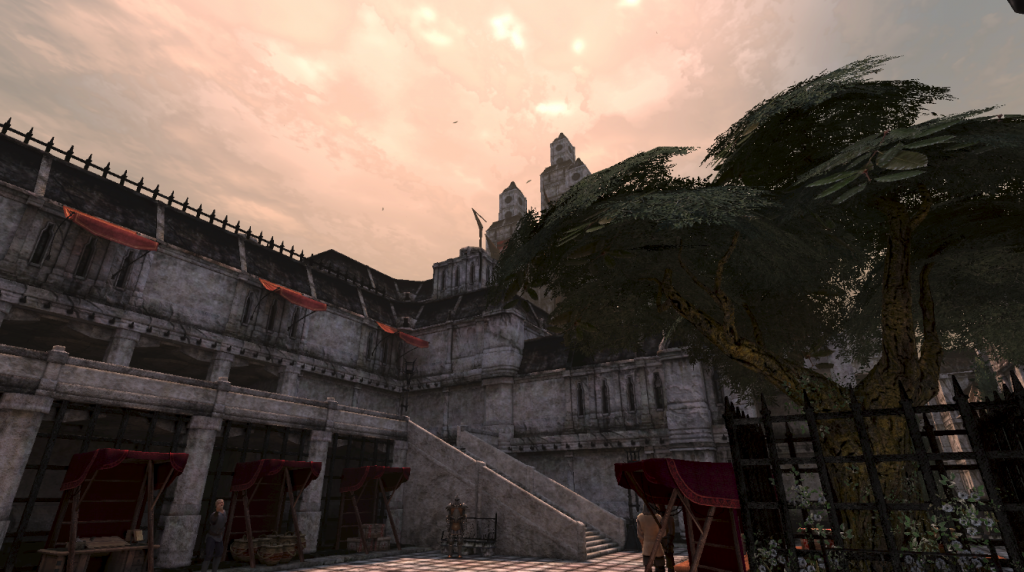Evolution is a necessity for all things, especially in today’s entertainment industry, where companies must adapt to their audience’s preferences quickly or perish in their competitor’s wake. Since the first game was released to the public, video games have grown and expanded exponentially to continue entertaining its growing audience. Bioware has recently released more information about their upcoming game, Dragon Age: Inquisition, the third installment in the popular Dragon Age series. The company is clearly excited with the progress the series has made and is eager for the new release stating “it’s their most ambitious game to date” (source). There is no doubt there have been several changes between Inquisition and its two previous games, Dragon Age: Origins and Dragon Age 2, but how much has the series evolved since 2009, when the series first began?
One of the many aspects the developers at Bioware are openly thrilled about regarding Inquisition, is the use of EA’s Frostbite 3, the next generation engine responsible for powering such games as Battlefield 4 and Plants Versus Zombies: Garden Warfare. The engine helped the Dragon Age developers create an immersive environment with stunningly improved graphics, especially compared to Dragon Age: Origins and Dragon Age 2. When Origins was released back in 2009, it had nowhere to go but up regarding graphics and gameplay, which were relatively outdated and clunky in comparison to other games released that year. What players got in return though was an extensive map dotted with interesting, lore-soaked environments. From the bustling streets of Denerim to the massive underground city of Orzammar, caverns streaming with lava and darkspawn.

Then Dragon Age 2 was introduced in 2011 with a heavily updated version of Eclipse, called the Lycium Engine. The graphics have noticeably improved between games and the gameplay became faster and more appealing to the eye without completely diluting the original combat style Dragon Age fans are accustomed to. Unfortunately, one of the great things about Origins was stripped away in Dragon Age 2. The first ten minutes of the game are all the player sees of the Ferelden countryside, before confined to a single, beige colored city and its pale neighboring mountains. Only with the assistance of downloadable content was the player able to break free of the walls and once again explore the country.

Thankfully, the player will regain the joyful freedom in Inquisition, traversing where ever she or he wishes. Ray Muzyka, former CEO of Bioware, said in an interview that the developers were looking to open world games such as Skyrim for inspiration on how exploration and areas would work. According to a blog post written by Cameron Lee, producer at Bioware, each location will have “its own realistic ecosystem, with predators, prey, bandits, and opportunities.” (source). In addition to the superior graphics and seemingly limitless exploration, combat has been improved as well. Inquisition developers have stated that they are hoping to bring back a style of combat that has players think more tactically and strategically when fighting an enemy. The player will also have the option to pause and play or play in real time.

Whereas Inquisition developers have been openly enthusiastic about gameplay and in-game environment, they have been somewhat elusive in regards to the story and characters. Dragon Age: Origins provided the player with a very focused story and several, very different, intractable teammates. The protagonist was mum and interaction was reminiscent to previous Bioware games such as Jade Empire and Knights of the Old Republic. The story starts off with the player choosing his or her own beginning from various “factions”, which then adjusted dialogue options, how other characters responded to you, and certain quests accordingly. The plot itself mirrored the game’s dark and gritty tone. A hero torn from their family and friends through unforeseen events and is cast into an old and dying group of heroes who’s only goal is to rid the world of an unimaginable evil. Though this one may have just described roughly 50 different video games and movies, Origins’ story is without doubt compelling enough to have earned several awards for its role playing aspect and story. Another great feature is the number of ending the player can get as the result of their choices and interactions with characters, making the replay value high.
Dragon Age 2, on the other hand, adopts a different style of storytelling. Unlike Origins, the player is cemented into a single customizable race (human). As a result, the main way characters and the story changes is if the player selects a different class or different dialogue options, causing subtle changes throughout the game in dialogue and certain quests. Also unlike Origins, the protagonist actually has a voice. The dialogue options work similarly to Bioware’s other famed series, Mass Effect, allowing relatively seamless interactions with NPC’s. In regards to the plot, between Origins and Dragon Age 2, the story loses a lot of focus and drive. Instead of the main character having a solid end goal, we find ourselves drifting almost aimlessly into different events. Between that and the two slightly different endings a player can get, replay value is only moderate.

From what little the developers have released in regards to the story and characters, we know there will be a return of friendly (and not so friendly) faces from past games. In addition, players will have significantly more options when it comes to character creation, including being able to play as any race, multiple voice options, as well as options typically found in a Dragon Age game. The story puts the protagonist back into a more focused role. The player is cast into the position of the Inquisitor, leader of the Inquisition during an all out civil war between templars and mages. How the Inquisitor will play a role in the war, is completely up to the player. The game is said to have over 40 unique endings, Theoretically making the replay value surpass both games combined.
Undoubtedly, Dragon Age has evolved much since it first embraced the gaming community five years ago. We’ve seen improvements and we’ve seen drawbacks. With luck Bioware will do nothing but astonish gamers with their star project this year and with luck Inquisition will set a new standard that future Bioware games will strive to reach.


 …WOOLY DESERVES BETTER LOL!
…WOOLY DESERVES BETTER LOL!